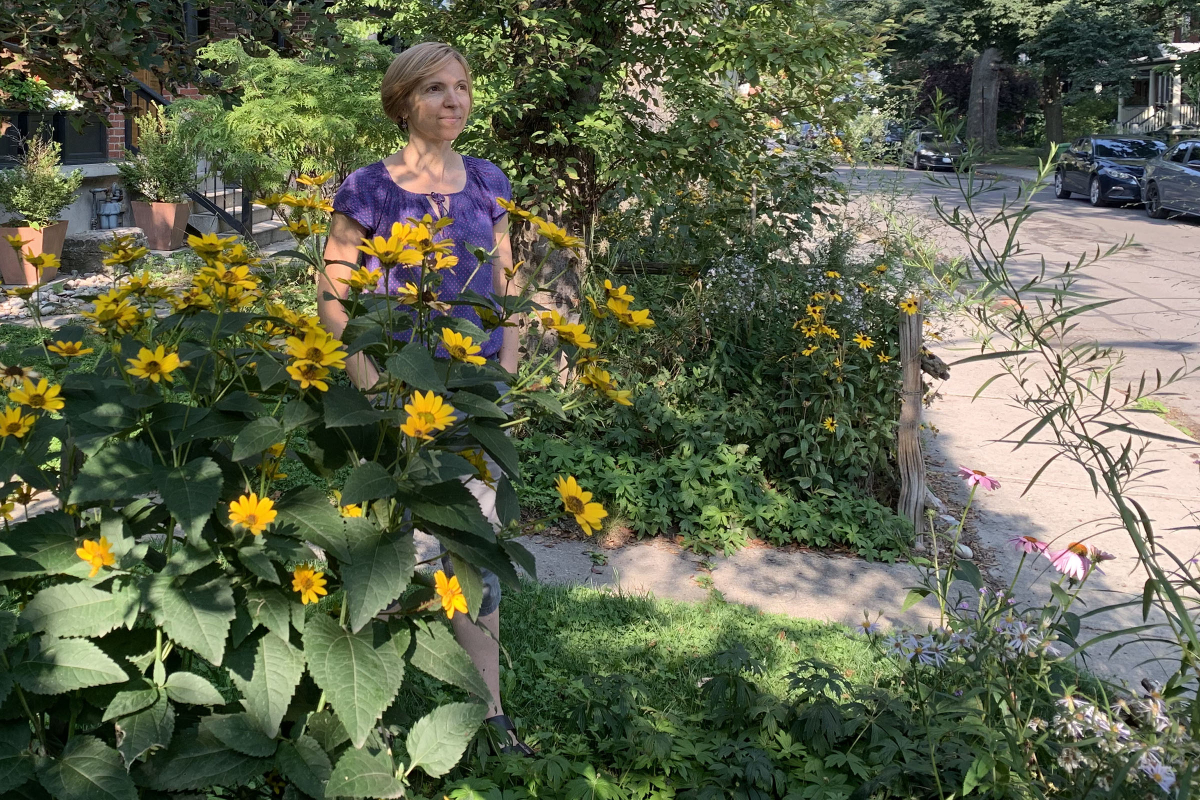Support strong Canadian climate journalism for 2025
As hot and dry conditions persist throughout North America, some Canadians are rethinking whether water-hungry grass lawns are a good idea.
This summer, many parts of Canada have seen rivers, aquifers and water reserves run low as the country experiences periods of intense drought. To conserve water, North American cities have targeted lawns — responsible for up to a third of cities’ use of drinking water in the summer. Now, Canadian cities are encouraging residents to let their lawns turn golden brown.
In the U.S., the city of Scottsdale, Ariz., has gone even further to ban grass lawns on some new houses. As of Aug. 15, new single-family homes in the city can no longer have grass lawns in the front yards. The ordinance was widely accepted by residents in the arid desert city.
Colleen Cirillo, the rewilding communities campaigner for the David Suzuki Foundation, said it’s time to rethink manicured green lawns as a cultural norm.
“You don't have to travel far in Canada or the States to see that the lawn is still quite dominant,” Cirillo said. “That is an outdated norm. I'm saying don't remove it entirely, but let's not make it the default.”
Canadian cities are running drier this summer. In Calgary, the Bow River is the lowest it’s been since 1911. According to the Canadian Drought Monitor, in July, a stretch of Alberta about 200 kilometres long faced exceptional drought expected to occur once in 50 years. That same month, about half of Vancouver Island experienced extreme drought.
And it’s only going to get worse. Scientists expect to see longer and more intense periods of drought more frequently as the planet warms.
The drought conditions have prompted many North American cities to crack down on how often people water their lawns.
Calgary has entered its first state of mandatory water restrictions, which regulate outdoor watering and control the growth of new grass lawns. The Sunshine Coast Regional District, northeast of Vancouver on British Columbia’s Lower Mainland, has run through all four stages of water restriction for five of the past nine years.
In May, Quebec City implemented restrictions on outdoor watering to two hours one day a week to reduce drinking water consumption. In Saskatchewan, the town of Wilkie ordered residents not to water lawns during the hottest times of the day in the summer.
In Metro Vancouver, which reached its second of four stages of restriction on Aug. 4, no lawn watering is allowed.
Several cities in the region are trying to reward residents who don’t water their lawns. In Port Coquitlam, about an hour’s drive east of Vancouver, the city is running a campaign called “golden streets” for the first time. Residents can submit pictures of their golden-brown lawns to the city for the chance to win gift cards to local businesses or for a block party.
Port Coquitlam public works manager David Kidd said the reward could be a fun way to help residents adhere to the water restrictions.
“People are used to having lush, green grass,” Kidd said. “We said, ‘Let's celebrate your golden brown lawns.’”
In Port Coquitlam, Kidd said lawn watering is the No. 1 use of drinking water in the summer and early fall. According to the region of Metro Vancouver, water use jumps by about half during the summer and fall, largely due to lawn watering. In the summer, Calgary estimates lawn watering contributes to a 40 per cent jump in water use. The City of Kelowna estimates household lawns account for about 24 per cent of water used in the Okanagan.
“We're really aligned with the water restrictions, and the idea with the contest is to support our residents to be successful,” Kidd said.
The nearby cities of Chilliwack, Abbotsford and Mission are all holding similar contests this year.

Instead of lawns, Cirillo suggested growing native plants, which can retain water in soils better than grass lawns.
Kidd said a ban on lawns would certainly conserve water. However, with responsible water management and the current restrictions, lawn bans should not be needed in Canada.
“Our drinking water is a precious resource and must be managed and used wisely,” Kidd said.
Cirillo said instead of a ban on lawns, which could be divisive, incentives to conserve water could be more effective in convincing Canadians to move away from their green grass lawns.
“It's always a question of carrot or stick,” Cirillo said. “Maybe we need a combination of both as we try to instil a new land ethic.”






Comments
There is another twist to the need of water on immaculately green lawns! The watering of Golf courses in order to have a perfect «green » . And it is worst when those 18 holes Golf courses are in the desert. If you do a google search with the words « Arizona, Golf courses » you will find the ads for all those Golf courses. Watering an eighteen hold Golf course in the scorching heat of the desert of Arizona takes a lot of water. Especially when the Colorado river and aquifers such as the Ogalala are being drained at an alarming rate. Are Golf courses in the desert a necessity? Or is it squandering a precious resource so that grown men and women can play?